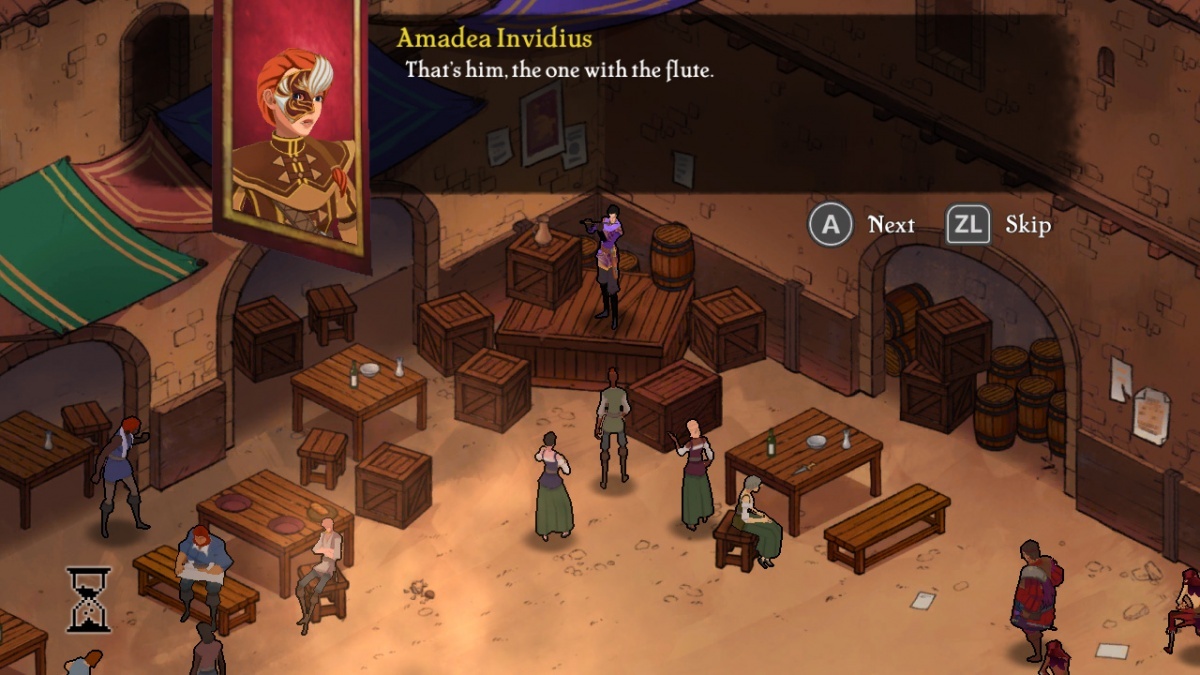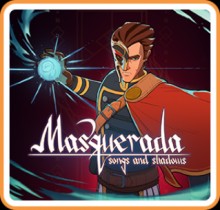Masquerada: Songs and Shadows (Nintendo Switch) Review
By Renan Fontes  02.07.2019
02.07.2019

A good first impression is a truly powerful thing. By starting off on the right foot, mistakes can be forgiven and flaws can be overlooked. A good first impression is a promise of what's to come. Opening strong can entice any audience to go with the flow, even if said flow isn't particularly engaging right away. Masquerada: Songs and Shadows opens with an incredibly strong start on a conceptual level. A full on invasion coded in clever subtext, and presented with plenty of flare, the game proper boasts to be a gripping experience. Unfortunately, a good first impression hurts all the more when the rest of the package can't pick up the slack.
Tutorials are seldom ever particularly engaging, but Masquerada: Songs and Shadows makes the most out of its introduction, more so than most titles would do. Rather than just being a basic introduction to the gameplay, apart from introducing the core mechanics at play, the tutorial establishes character relationships and a surprisingly gripping central conflict. Taking place entirely in a palace currently being infiltrated, were players take control of Cyrus Gavar, a masked man leading a small band of other masked fighters in an assassination attempt. Through subtext, it becomes quite clear that the central setting, Citte del Ombre, is in dire straits with Cyrus attempting to pull off what's implied to be something of a coup.
The opening is mature, dark, and manages to even end with something of a twist as Cyrus miserably fails in his task, immediately establishing that not even the charismatic lead is safe in the Citte. Unfortunately, rather than picking up where Cyrus failed and immediately building off what the tutorial established, Masquerada: Songs and Shadows seems content doing what most RPGs do after an exciting opening: nothing particularly memorable.

It's quite cliché for the genre, and clichés aren't inherently bad, yet something about a tutorial section opening with the brother of the actual main protagonist dying in the middle of a politically charged attack only to shift to the considerably less interesting lead doesn't quite work outside of the context of, say, Final Fantasy XII. It also doesn't help matters that there's a serious drop in quality regarding the character writing when control shifts over to Cicero Gavar.
Although Cyrus was only playable for less than ten minutes, it was clear he had a meaningful history with not just the world around him, but the characters, politics, and immediate setting. He had ideals that cost him his life. That alone is enough to craft a compelling character, to say nothing of how he actually dies, at the hands of a remorseful colleague. There's clearly more to Cyrus' brief stint than what's made immediately clear which builds up a momentum that should naturally lead into following the story from the eyes of his companions.

Shifting to his brother and allowing Cicero to piece together the plot while also eventually filling his brother's role, does spell out a clear arc for Cicero, but it's an arc that's been done, that's been done better, and that frankly doesn't suit the tone of the tutorial whatsoever. Cicero himself is also a fairly bland lead. Quippy, charming, a little bit funny, but knows when to be serious - Cicero is as generic as they come. He does have some semblance of depth, but that's mostly thanks to the surprisingly excellent voice direction and should by no means be attributed to the actual writing.
In general, the voice cast does a great job at bringing the banal writing to life. In the same way bad voice acting can hurt a good script, good direction can elevate a weak one. Characters interact with one another as people, have nuanced reactions to the world around, and emote without going over the top. It's a rare treat that almost salvages the fairly uninspired story. If it weren't for the gameplay, this would be a title worth experiencing for the story alone.

Sadly, the gameplay is quite the fixture, even on Story Mode, which severely diminishes the challenge in battle. When it comes down to it, this isn't a game that's particularly fun to play. Combat is borderline laughable when compared to other RPGs that use a real time, auto attack centric battle system. Enemies just run all over the place with no rhyme or reason, and there isn't any depth whatsoever to how battles play out despite how much the tutorial builds up certain mechanics. There's no real room for strategy, both because the title isn't designed to accommodate strategy and because the enemy design is pitiful.
Worse yet, there are frequent load screens. This is an RPG that loads more often than its PlayStation brethrens. Just about every screen transitions into a loading screen, and they're not fast loads, either. They're intrusive and kill the flow of gameplay. Not helping matters is the horribly uninspired dungeon design: linear, but with no interesting set pieces or battles to spice up the pace. As is, Masquerada: Songs and Shadows is an excruciatingly slow RPG that wastes a good premise in favour of something boring, but familiar.

Cubed3 Rating
Subpar
Masquerada: Songs and Shadows is an incredibly disappointing RPG, not because it's outright bad, but because it has everything it needs to excel. Gorgeous visuals, a well directed voice cast, and the tutorial's promise of a political drama set in a city that's clearly on the verge of a coup, all make for a compelling experience. Unfortunately, the visuals are let down thanks to a painfully bland dungeon design, the script isn't anywhere near the voice cast's direction, and the actual story opts for a bafflingly generic approach following the intro. It certainly doesn't help matters that load times are abundant, dragging an already slow title to a crawl, and that the core combat is somehow both chaotic and uninteresting. Despite a relatively strong start, this simply isn't worth the time or effort.
Comments
Comments are currently disabled

 Sign In
Sign In Game Details
Game Details
 Out now
Out now  Out now
Out now  Out now
Out now  Out now
Out now  Subscribe to this topic
Subscribe to this topic Features
Features





 Top
Top

